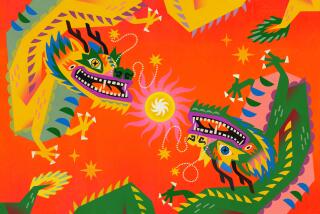For Some Chinese, Living by the Numbers Is Safest
- Share via
Emblazoned in 3-foot-high characters on the side of a medical office building in Monterey Park are the numbers 941-943.
The numbers are merely the building’s address, but when the numerals 9, 4, 1, 3 are pronounced in Mandarin or Cantonese dialects, they sound like a common Chinese saying: “Nine die; one lives.”
“It means the possibility of surviving is almost zero,” said one real estate agent, shaking his head in disbelief. “Imagine a medical building with that number? I won’t even mention the property to a client.”
Now consider the BMW 528e, that trendy symbol of the American yuppie. In Cantonese, the model number is easily recognizable as the phrase: “Not easy to prosper.”
The first two digits of the Volvo 240 have the even more horrifying pronunciation: “Easy to die.”
“They’re not popular cars” among Chinese, said Gregory Tse, owner of Wing On Realty in Monterey Park, the only city in the nation with a majority Asian population.
Such is the world of Chinese numerology, an amalgam of linguistic coincidences and age-old superstitions from the Far East that is exerting a quirky effect on American life in places where Asians have settled.
The superstition has influenced choices on buying cars, selecting telephone numbers, picking lucky Lotto combinations and even determining wedding dates.
But nowhere has it had a more far-reaching effect than in the world of commercial and residential real estate, especially in the San Gabriel Valley with its burgeoning Chinese population.
Real estate agents say fear of the number four, which, when translated, sounds like the word “death,” and the popularity of the number eight, which sounds like “prosperity,” have become factors in the marketplace.
Some deals have dangled in escrow waiting for a lucky date to close, prices have been determined by the number of eights in the final figure and even hardened investors have become squeamish when a property has the number four in its address.
While many Chinese speakers are aware of the superstition, only some actually believe it.
Double Meaning Recognized
For example, in the Monterey Park building on 941-943 S. Atlantic Blvd., two of the eight offices are rented to Chinese.
Yu Dafang, an acupuncturist who has an office in the building, said he recognized the double meaning of the address the minute he saw it, but decided it was unimportant.
“At first, people said things, but not anymore,” he said. “It’s not polite.”
Nonetheless, awareness about the effect of the superstition has spread to the point where even non-Chinese are now watching their numbers.
Last year, Toni Foster-Quiroz, president of Cosmic Escrow Corp. in Monterey Park, opened a new office on Garvey Avenue. One of the first things she did was pay the city $500 to change the building’s address from 114 to 116 to remove the number four.
‘A Little Edge’
“I don’t believe it, but if it makes my clients feel better about coming here, it’s OK with me,” she said. “It gives us a little edge.”
The key to the superstition lies in the tonal nature of Chinese in which one pronunciation can have many meanings depending on which tone is used.
Mandarin, the dialect spoken by those from Taiwan and parts of mainland China, has four tones; Cantonese, the dialect of Hong Kong and Guangdong province, has nine.
The Cantonese, by most accounts, are the main followers of the superstitions.
In that dialect, every digit except seven and zero has a clear dual meaning. The number one is the same as “certainly,” two is “easy,” three is “life, birth or to do business,” four is “death,” five is “no or not,” six is “happiness, wealth or continuous,” eight is “prosperity,” and nine is “long lasting.”
Fascination With Numbers
The fascination with numbers is more extensive in Hong Kong, Taiwan, Singapore and other parts of Asia. In Singapore, properties are sometimes offered at a discount because of unlucky addresses and in Hong Kong, vehicle license plates with lucky numbers, which are competitively bid, can cost thousands of dollars to obtain.
The most notorious of the numbers is four, and some buildings, such as the Bank of Trade building in Chinatown, have no fourth floor just because of the connotation of death.
Woe be to the person with the address of 14, which sounds like the phrase: “certain death.” The number 24 is a slight improvement, “easy to die.”
Watch out for 424, which in Mandarin is pronounced in the same way as “die and die again.”
Just having four anywhere in an address can be unsettling.
Not Worried
Three years ago, architect C. K. Moh bought a rental house in Monterey Park with the address 434.
Moh said he was not worried about the address when he bought the property, but later paid the city $500 to have it changed to 438 after he became involved in a lawsuit related to the property.
“I don’t really believe in it, but, well, I’m trying to avoid bad luck,” he said. “I’m playing it safe.”
City officials in Monterey Park report they receive two or three requests a month for address changes. The vast majority of applicants, who pay $500 for the service, are Chinese.
Arcadia gets about 40 requests a month, all of which are futile because the City Council about two years ago banned address changes, said Joseph Lopez, director of public works.
Certain Lucky Combinations
“There was such a large volume of requests,” Lopez said. “If we made a change for every request, it would really create an intolerable work load.”
Four can be lucky in certain combinations, such as the number 154, which sounds like the phrase: “No way to die.” Likewise, the pronunciation of the number 148 closely resembles: “A lifetime of prosperity.”
Eight is by far the most sought-after number and the arrival of Aug. 8 last year--8/8/88--sparked a flurry of weddings, banquets and Lotto purchases in areas with large Chinese populations, such as San Francisco and Los Angeles.
The reputation of the number is such that some sales people have latched onto it as a gimmick to attract Chinese buyers.
‘Obvious Ploy’
Georgene Neely, a San Marino real estate agent, said she has noticed in recent years that more home sellers are using the number in asking prices, such as a house that was recently on the market for $988,000.
“It’s an obvious ploy to appeal to the foreign buyer,” she said, adding that she views the practice as unprofessional.
Neely said buyers also have asked to add number eights to real estate prices for good luck, such as a recent lease agreement involving several thousand dollars in which the tenant added $1.88 to the final figure.
But these digits are the easy cases. The meanings of other combinations can be open to a wide range of interpretation. Numbers that sound one way in one dialect also can sound entirely different in another.
‘One of the Worst Numbers’
Take the number 169. Mandarin speakers would shrug their shoulders, but to a Cantonese “it’s one of the worst numbers you can have,” said Valiant Chiu, the head of Garfield Realty in Monterey Park.
The number is pronounced like an obscene slang term.
How much effect all this really has on business is uncertain.
Richard Brooks, spokesman for BMW of North American Inc., said he was unaware of the meaning of the BMW 528e, which coincidentally was discontinued last year.
But George Sarrade, sales manager of Century Motor Sales, a major BMW dealership in Alhambra, said he has noticed that the dealership has sold few 528e models to Chinese. “Son of a gun,” he said. “It might have something to do with that.”
Blown Out of Proportion
Most real estate agents say superstition’s power to affect the market has been blown way out of proportion.
Jimmy Shen, manager of Huntington Realty in San Marino, said a good house at a good price will always sell no matter how bad the number.
Shen, for example, lives in a house with the street number 404.
“It’s been a lucky number for me,” he said. “I don’t even care. This is America.”
Tse of Wing On Realty agreed that the superstition plays only a small role in business. “It’s minor,” he said.
To prove his point, Tse mentions the recent sale of a house with the street number 664--a terribly inauspicious number that sounds like the phrase: “continuous death.”
“We just cleared escrow on the house,” he said.
Only later does he explain that the sale to a Chinese family was contingent on changing the address from 664 to 662, which means “always easy.”
NUMBER SUPERSTITIONS In various Chinese dialects, some numbers sound like threatening phrases. Houses with such numbers may be considered unlucky; cars with such numbers may be shunned. On the other hand, the number 8 sounds lucky. Here are a few numbers and their “translations” in Chinese superstition.
In English In a Chinese Dialect 9,4,1,3 “Nine die; one lives.” (BMW) 528 “Not easy to prosper.” 4 “Death.” 8 “Prosperity.” 14 “Certain death.” 424 “Die and die again.” 154 “No way to die.” 148 “A lifetime of prosperity.” 664 “Continuous death.”
More to Read
Inside the business of entertainment
The Wide Shot brings you news, analysis and insights on everything from streaming wars to production — and what it all means for the future.
You may occasionally receive promotional content from the Los Angeles Times.











